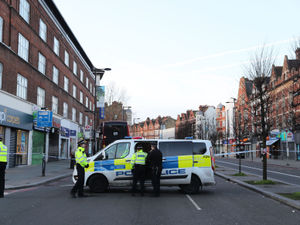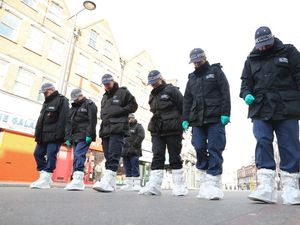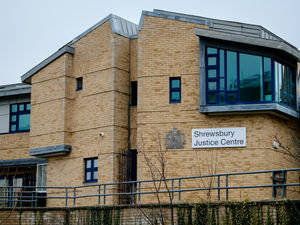Tough measures promised as questions remain over extremists
Tough new measures to keep terrorists behind bars have been announced following the latest attack by a convicted extremist.

Pressure is building on the Government and security services after fanatic Sudesh Amman became the second convicted terrorist to carry out a knife attack on the streets of London in the space of three months.
The attack came a day after the Shropshire Star revealed eight people convicted of terror offences in the last five years are now living in the West Midlands or Staffordshire after being released early on licence.
Amman who was jailed for possessing and distributing terrorist documents in December 2018, had recently been freed from prison, and had been staying at a bail hostel in nearby Leigham Court Road for the past two weeks.
He was shot dead by police after grabbing a knife from a shop and attacking two bystanders in Streatham on Sunday. A third person was injured by flying glass during the gunfire.
The 20-year-old was under police surveillance as he launched his attack, and was found to be wearing a fake suicide vest after he was shot.
Another terrorist, Usman Khan, had also been recently released from prison and was living in Stafford when he went on a deadly rampage at Fishmongers Hall in November, killing two and injuring three more. He was also wearing a fake suicide vest. Staffordshire Police is being investigated by the Office of Police Conduct because it had had contact with him before the attack happened.
Boris Johnson has now pledged to end the early release of terrorists following the two attacks. His intervention came as questions continued to be asked about what is being done to ensure offenders who are already out are being properly supervised and are not allowed to slip through the net.

The Ministry of Justice told the Shropshire Star before Sunday’s attack that measures to supervise convicted terrorists had been stepped up.
And former head of UK counter-terrorism policing Sir Mark Rowley said there was a “case” for giving terrorists indeterminate prison sentences.
But he also said that they should also be given rehabilitation and de-radicalisation support so they can change their ways, adding: “If someone is clearly driven by an ideology and they believe that slaughtering other people is a sort of God-given purpose, then I can see a case for that.
“As long as we put alongside it the rehabilitation and de-radicalisation programmes to give someone the opportunity to change their ways and be released.
“I don’t think there should be a lock-up-and-throw-away-the key – we need to be as equally aggressive about trying to help people turn their lives around as we are determined to protect the public.”
Former West Midlands Police Superintendent Mike Layton insisted police surveillance teams and security services are adequately funded and are being given the right tools to do their job.
He said: “It is about making sure police services have sufficient resources for investigations and protecting the public. It’s about the courts giving consistent punishments. For those that want redemption and rehabilitation it’s about making sure resources are there and that there are sufficient numbers to do it effectively.”
West Mercia, West Midlands and Staffordshire police forces were unavailable for comment.
PM: Early release has ‘come to the end of its useful life’
The Government has vowed to introduce emergency legislation to prevent terrorists being automatically freed from prison half way through their sentence.
Justice secretary Robert Buckland also said those jailed for terror offences will have to appear before the parole board before they can be released.
It came after Boris Johnson said the automatic early release of prisoners who pose a threat to the public has “come to the end of its useful life”. The PM said de-radicalising people is a “very, very difficult thing to do”.
He said a new tougher stance on those convicted of terror-related offences, adding: “There is a big psychological barrier – people find it hard to get back over.
“That is why I stress the importance of the custodial option and that is why I have come to the end of my patience with the idea of automatic early release. I hope that people will understand why we’re doing that.
“This is a liberal country, it is a tolerant country.

“But I think the idea of automatic early release for people who obviously continue to pose a threat to the public has come to the end of its useful life.”
The Prime Minister had already promised changes following November’s attack, in which convicted terrorist Usman Khan travelled from his home in Stafford to London before murdering two near London Bridge. Measures included forcing dangerous terrorists who receive extended determinate sentences to serve the whole time behind bars.
But the changes would not have affected Streatham attacker Sudesh Amman, who was convicted of a less serious offence. He would also have received a lower sentence because of his age and the fact that he pleaded guilty.
Mr Johnson said he was concerned offenders like Amman were actually becoming more radiclised inside jail.
He said he was “concerned” about the way convicted terrorists in prison are handled. The PM added: “Do you detain them on block, in one group, and try to keep them together because that avoids them, as it were, infecting or passing the virus of their beliefs to others in jails, or do you disperse them and try to stop them reinfecting each other?”
Amman’s mother Haleema Faraz Khan said he had become more religious since being in prison.
She said that she believed he had been radicalised while in high-security jail Belmarsh.
Jailed aged 18, Amman’s trial heard his life goal was to become a martyr

IS supporter Amman was just 18 when he was jailed for three years at the Old Bailey.
The court heard that he had listed dying a martyr as one of his “life goals”, and had posted al Qaida propaganda on a family WhatsApp group, exposing siblings as young as 11 to graphic material.
His stash of manuals on bomb-making, knife-fighting and close combat included the titles Bloody Brazilian Knife Fighting and How To Make A Bomb In Your Kitchen.
It has been reported that concerns were raised about him in prison.
Scotland Yard said armed officers were following him on foot as part of a “proactive counter-terrorism surveillance operation” in Streatham High Road.
The three victims were taken by ambulance to south London hospitals. One man, in his 40s, is no longer considered to be in a life-threatening condition following treatment.
A woman, in her 50s, who had non-life threatening injuries has been discharged. Police said a second woman, in her 20s, who suffered minor injuries from flying glass continues to receive treatment.
Mechanical engineering apprentice Jignesh Khomani, 20, a former neighbour of Amman in Harrow, described him as “a pretty average guy”. He said: “I just did not expect anything like this would happen. He did not seem like a character who would do something like that.”
A teenager, who said she knew Amman from the local neighbourhood, said he used to talk about being a terrorist but she and others thought he was joking.





